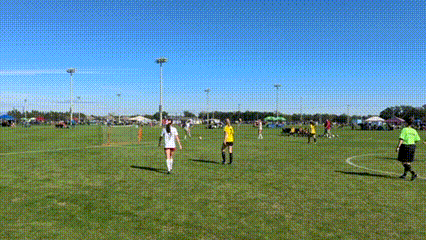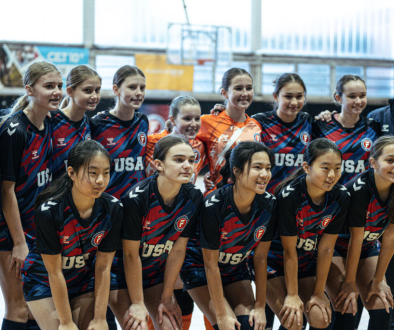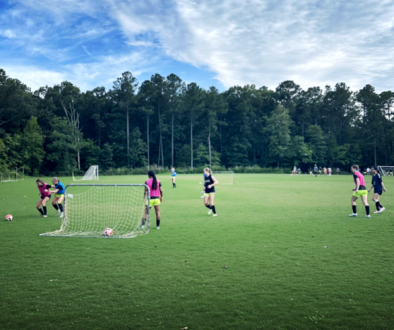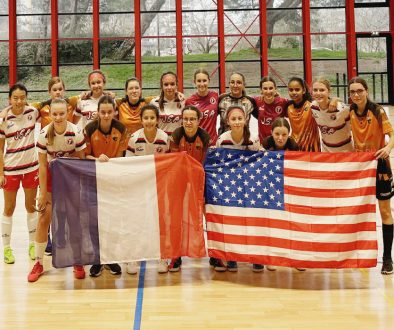3v3 National Championships
This Thanksgiving weekend, our team Mighty Minions, reigning champions of the Southeast 3v3 Regional Championships in late July for the high school age group, arrived in Foley, AL to compete in the National Championships. There have been some changes in our team composition since July, with Katie, a sophomore, and Caitlyn, a freshman, unable to participate for various reasons. As a result, we brought in reinforcements in the form of Leila and Gabby. However, this time around, all six members of our team turned out to be middle schoolers (4 eighth graders, 2 seventh graders), highlighting our age disadvantage.
During several 3v3 games in Alabama this summer, we felt that the competitiveness in the 2010 age group was not sufficient for our developmental goals. Consequently, we all participated in the high school division, effortlessly securing first place in each tournament. Participating in the high school division as middle schoolers also resulted in higher total points than usual. This is also why we were automatically advanced to the national finals for the 2008 age group, perhaps as a reward for our hard work. However, for us, receiving this handed-out championship or runner-up title has never felt like an honor. Also, this, coupled with the perceived lack of competition in the high school age group in Alabama, led us to mistakenly believe that we could be competitive at the national level. Reality taught us a valuable lesson.
In the first game of the national tournament, we faced S3 from Illinois, a team in the 2008 age group. A 2-0 lead at the start had us imagining ourselves wearing the national championship medals, but reality quickly sobered us up. The opponents not only equalized but also surpassed us, and we ended up losing the first game 2-4. Even now, our mindset remains somewhat optimistic, thinking that our opponents are probably the strongest in the tournament, so finishing second wouldn’t be too bad.
In the second game against Lady Sharks from Arkansas, a 2-5 scoreline served as a loud wake-up call, especially since the opponents had just lost 7-2 to their first opponents an hour earlier.
In the third and fourth games, we were defeated by ECNL Fusion Girls from North Carolina and defending champions St. Louis Flash from Missouri, with scores of 11-1 and 13-3, respectively. Both games were prematurely terminated due to the Mercy Rule, as the goal differentials exceeded 10 goals. With another team from Missouri, PB Evolution, faring worse than us, we finished in fifth place among the six teams.
Image below is the scenario from today’s match against our toughest opponents, the ECNL Fusion Girls from North Carolina. Due to the fact that they are four years older than us, they had the upper hand in both experience and physicality. For over 2 minutes of game time, we couldn’t get a touch on the ball. At this point, the score was 1-10, and if they scored one more goal, the Mercy Rule would be triggered, ending the match due to a goal differential exceeding 10. After repeatedly passing the ball amongst themselves for over 2 minutes, one of their players casually slotted the ball into the net, and the game promptly concluded.
On the first day of the competition, the first four games were the qualifying rounds for the high school age group, and all of them have concluded so far. However, at 3:30 in the afternoon, we have another game, the final for the 2008 age group in the high school category, arranged by the organizing committee. As mentioned earlier, since we are participating in the high school age group competition as middle school students, winning a game earns us more points than the high school teams, and considering our participation in all the summer 3v3 tournaments, the numerous games and point advantages have “unfortunately” made us the team with the highest points in the 2008 age group nationwide. As a result, we directly entered the final, and at 2:30, S2 and Lady Sharks, who had just defeated us in the first and second games respectively, will compete in the semi-finals. In the end, we once again lost to Lady Sharks in the final with a score of 3:6, securing a runner-up position. However, none of our players were excited about this outcome.
On the second day of the competition, as the team ranked 5th in the high school group qualifying rounds, we competed against the 4th-ranked team, S3, for a spot in the semi-finals. If we lost, we would be directly assigned to participate in the lower-level round-robin finals held in the afternoon for all losing teams. In reality, S3 is the team closest to us in terms of strength, but due to changes in on-field mentality influenced by external factors, we always find ourselves making basic mistakes after taking the lead. Adding to that, there were two blatantly unfair referee decisions, and the opponent even caused one of our players to bleed from the mouth, with no action taken by the referee. If being two years older means resorting to more cunning tactics, we’d rather not have such experience.
In summary, we lost the match by a narrow margin of 3:4. What’s most absurd is that after the game, a parent from the S3 team side arrogantly exclaimed, “We should be the second in the 2008 age group.” The level of cognitive dissonance is simply unbelievable. As mentioned earlier, our entry into the final was a result of our summer-long efforts and the differential treatment in scoring. Even though we secured the runner-up position despite losing the final, none of us were happy, and none of us considered ourselves genuine runners-up. The logic is clear; we recognize that our abilities don’t match up to a runner-up position. On the other hand, the parent from the S3 team seems to have a confused logical framework, believing that by beating us, they deserve the runner-up position. It’s unclear whether she overestimates us or fails to acknowledge the shortcomings of her own team. Perhaps it’s due to a cognitive barrier resulting from a lack of education.
By the way, this team called S3, probably hailing from the backwoods, has players whose parents seem to have a lower cultural and educational background. They are the only team aware of our age disadvantage. Yet, despite this awareness, their on-field players engage in a ballet of boorish antics. Meanwhile, their parents on the touchline contribute with a symphony of cheers and provocative maneuvers that could make even the good folks of Illinois cringe. To prevent YouTube from slapping age restrictions on these videos, I even need to invest more time in editing out those segments. Perhaps, in the midst of their daily troubles – likely numerous – they seldom taste the sweetness of victory in peer matchups. Hence, they treasure this bestowed blessing of facing a younger opponent as if it were the rarest delicacy fate has served them.
After this game, we actually had another game in the afternoon that we could play. All six of our players actually wanted to participate, and many of the parents were supportive of waiting until the afternoon to play and then heading home. There was even a parent who, anticipating the possibility of an all-day game plan, chose to stay overnight for the second day. However, one parent felt that waiting for four hours was too long and chose not to participate in the afternoon game, and successfully convincing everyone else to follow suit. Actually, I could sense everyone’s reluctance, but no one was willing to speak up and explicitly advocate for staying, so we missed the opportunity to unite and make a different decision. On the way home, I told Sommer and Sydnie in the car that what happened today was a very good example of the “importance of eloquence.” If you don’t speak up to defend yourself, you’ll always be accompanied by regret. If you’re confident enough, speaking up can make everyone accept your point of view.
I could see the disappointment and helplessness in some parents and players as they realized that embarking on the journey back was inevitable, meaning they would miss the next scheduled game that they originally intended to play. Since everyone had reserved enough patience, money, and time for this final, why was a relatively short four-hour wait deemed so unacceptable, leading others to miss out on the opportunity? I initially thought of volunteering to lead the willing players who wanted to stay and finish the last game, but suddenly seeing one player even changing out of her uniform, my enthusiasm dampened halfway.
No need to sugarcoat it—I’m genuinely very, very disappointed because choosing to give up when there’s still a chance to fight, even if that chance is seemingly insignificant and meaningless, always leaves a sense of regret. This is something I find very difficult to accept.
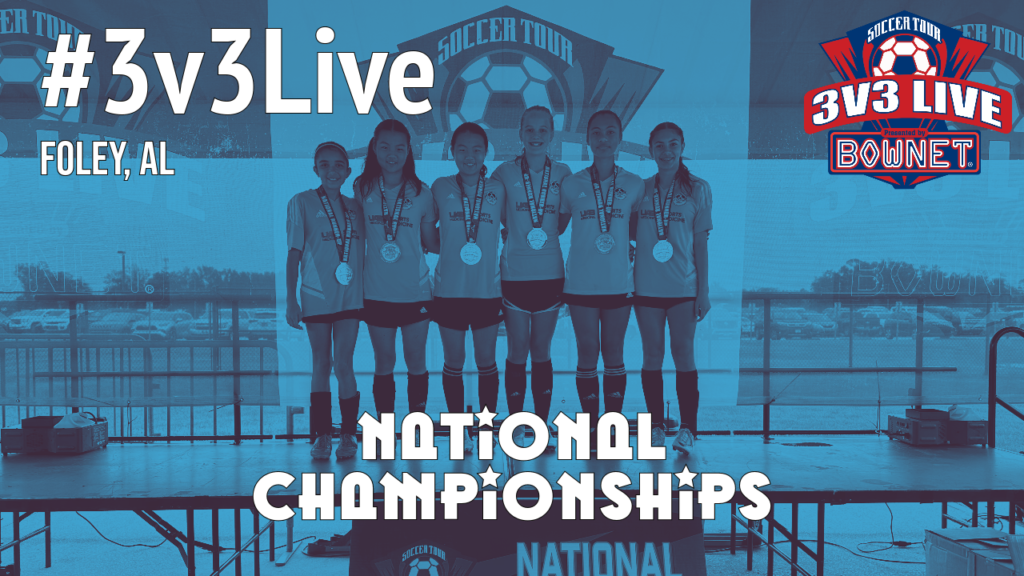
This participation experience has made me realize that in situations where there’s such a stark difference in age, physicality, and technical skills, this kind of practicing isn’t very valuable. Moreover, in these games, our performance couldn’t reach its best, playing in an environment surrounded by negative voices. Not getting encouragement and being unable to move in the right direction, each game became a battle against our own tolerance, testing if we could delay a mental breakdown a bit longer. I had to tell Sommer and Sydnie to play in the way their coach instructed during Futsal practice, ignore voices that they think are incorrect, and when lacking physical advantages, not resort to gambling with personal skills by abandoning the defending formation.
In summary, although the training value of this competition was minimal, and the personal experience and feelings weren’t great, it did make the players aware of the heights beyond the mountains. It can be considered an eye-opening experience.

